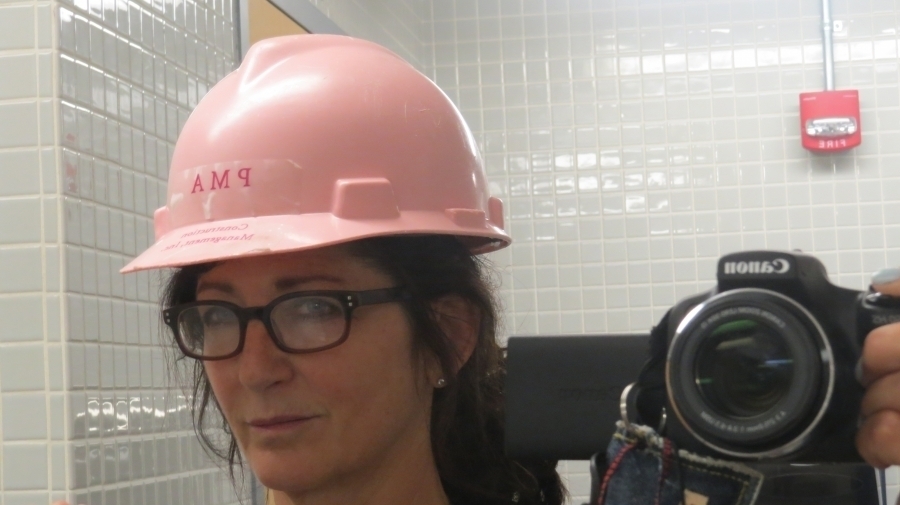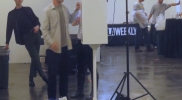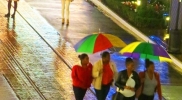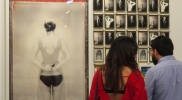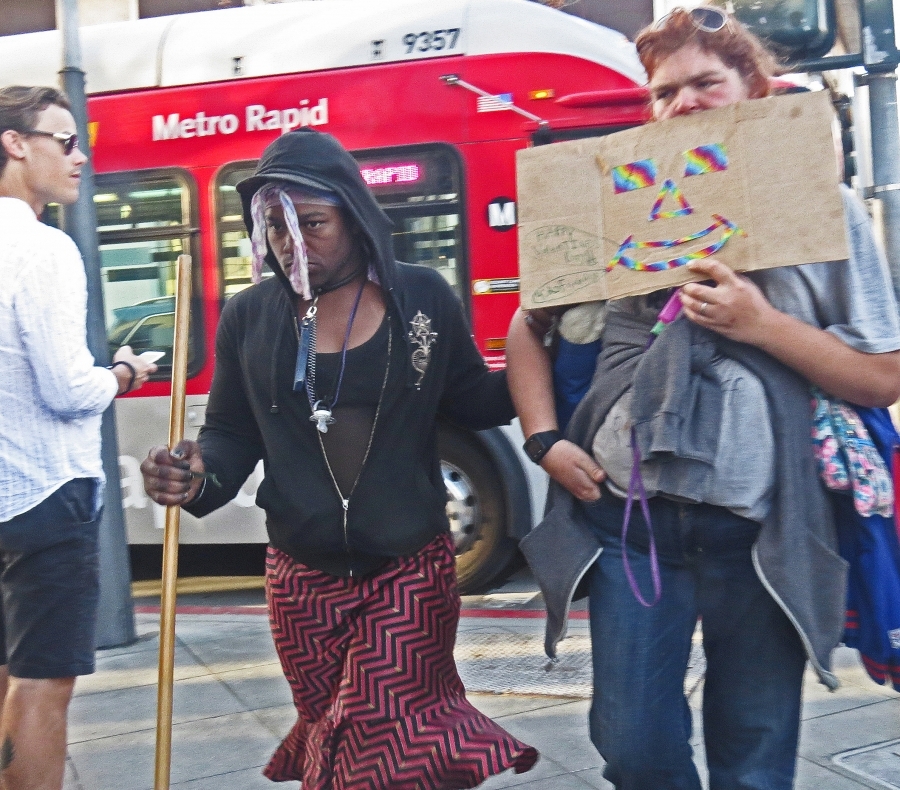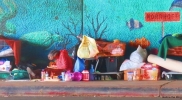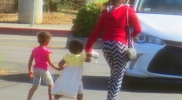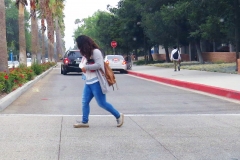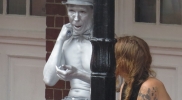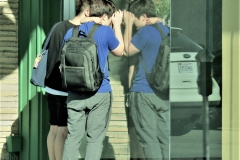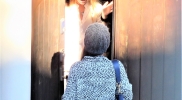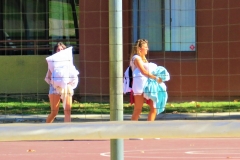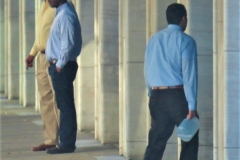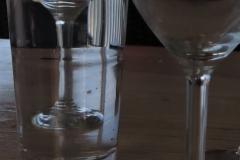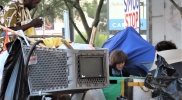|
|
Best Trivia - Rhythms of Life
|
Favorite Trivia – RHYTHMS OF LIFE
|
| “What a boon is Sunday! I can get out of bed just when the spirit moves me, dress and bathe leisurely, even with punctilio. How nice to dawdle in the bath with a cigarette, to hear the holiday sound of Church bells! Then comes that supreme moment when, shaven, clean, warm and hungry for breakfast and coffee, I stand a moment before the looking-glass and comb out my towzled hair with a parting as straight as a line in Euclid. That gives the finishing touch of self-satisfaction, and I go down to breakfast ready for the day’s pleasure. I hate this weekday strain of having to be always each day at a set time in a certain place.” [February 28, 1915]
W. N. P. Barbellion – The Journal of a Disappointed Man
|
“In bed we laugh, in bed we cry;
And born in bed, in bed we die;
The near approach a bed may show
Of human bliss to human woe.
Isaac De Benserade
|
| “I really need a day between Saturday and Sunday.”
The B Word Engagement Calendar
|
| “One lives a vast number of days but life seems short because the days repeat themselves so…The best way to have new days is to travel or be sexually promiscuous or work with intensity on a long creation.” [January 25, 1943]
Tennessee Williams – Notebooks: Tennessee Williams
|
| “I believe that we all in our present generation have lost an intensity of personality, an integration of mind, a sort of soul fulfillment, because we are so rarely alone. The modern inventions have, of course, given us great gifts, but they have also taken priceless assets away from us. They have taken our silences, our wholesome isolation. A man’s house is no longer his impregnable castle. Every busybody’s voice may reach him by telephone; the whole noisy, troubled world enters by the turn of a dial. And the nature of man needs some solitude.” [January 2, 1941]
Agnes Sligh Turnbull – Dear Me: Leaves from the Diary of Agnes Sligh Turnbull
|
| “Now everyone in the Neighborhood [Brooklyn, 1955] had a television set—even my father—and on summer nights the streets were emptier, as each apartment lit up with a pale blue glow.”
Pete Hamill – A Drinking Life
|
| “There is no love of life without despair of life.”
Albert Camus
|
| “Conformity knows no time or place; it is the struggle all of us face, to be ourselves despite the overwhelming pressure to be like everyone else.”
Anna Quindlen: “An Appreciation”, A Wrinkle in Time (Madeleine L’Engle)
|
| “Shut: Take a tip from nature; your ears aren’t made to shut, but your mouth is.”
Evan Esar – Esar’s Comic Dictionary
|
| “In life we either follow paths or make trails.”
David Baird – A Thousand Paths to Enlightenment
|
“Nobody’s perfect.
Everybody make mistakes.
That’s why pencils
got erasers on ’em.”
Pamela Strobel
|
|
“Gone is the simple college cycle of winning prizes, and here is the more complex, less clear-cut arena of life, where there is no single definite aim, but a complex degree of aims, with no prizes to tell you you’ve done well. Only the sudden flashes of joy that come when you commune deeply with another person or see a particularly golden mist at sunrise, or recognize on paper a crystal expression of a thought that you never expected to write down.” [December 13, 1955]
Sylvia Plath – Letters Home: Correspondence 1950-1963, ed. by Aurelia Schober Plath
|
| “What may happen to any one may happen to all.”
Publilius Syrus
|
“The streets a-bloom with pregnant women. They stand next to me in elevators. I see them on movie lines, getting out of taxicabs, choosing fruits and vegetables. Are we invisible to everyone else? Were they here before I was pregnant? Will they all disappear when I give birth? After that, will I only notice new mothers and new babies?” [July 23, 1977]
Phyllis Chesler – With Child: A Diary of Motherhood
|
| “Life is full of surprises for those of us who are inventive.” [January 24, 1962]
Gail Godwin – The Making of a Writer: Journals 1961-1965
|
| “The price of worrying about what might be and what might have been is missing what is.”
David Baird – A Thousand Paths to Long Life
|
| “Do you realize the illicit sensuous delight I get from picking my nose? I always have, ever since I was a child. There are so many subtle variations of sensation. A delicate, pointed-nailed fifth finger can catch under dry scabs and flakes of mucous in the nostril and draw them out to be looked at, crumbled between fingers, and flicked to the floor in minute crusts. Or a heavier, determined forefinger can reach up and smear down-and-out the soft, resilient, elastic greenish-yellow smallish blobs of mucous, roll them round and jellylike between thumb and forefinger, and spread them on the under-surface of a desk or chair where they will harden into organic crusts. How many desks and chairs have I thus secretively befouled since childhood? Or sometimes there will be blood mingled with the mucous: in dry brown scabs, or bright sudden wet red on the finger that scraped too rudely the nasal membranes. God, what a sexual satisfaction!” [January 25, 1953]
Sylvia Plath – The Unabridged Journals of Sylvia Plath, 1950-1962
|
|
“If there is any appalling and spiritually murderous sensation on earth, it is the knowledge that on a certain date or at a given time and place you have got to be somewhere doing some set, prescribed, definite thing. This winter we shall keep our horizon perfectly, absolutely, crystallinely open, ready every day for the scouring gales of impulse.”
John Mistletoe’s Journal, 1923 (Christopher Morley’s Book of Days for 1931 [December 11])
|
|
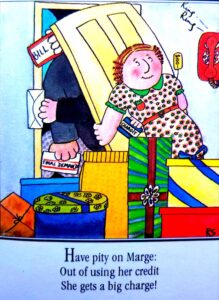
“Have pity on Marge:
Out of using her credit
She gets a big charge!”
John S. Crosbie – Crosbie’s Book of Punned Haiku
|
“If I see a man of integrity, what an occasion!
Really a freak, I would say, like a boy with a double member.”
The Thirteenth Satire: For a defrauded friend (The Satires of Juvenal – trans. by Rolfe Humphries)
|
| “Man is least himself when he talks in his own person. Give him a mask, and he will tell you the truth.”
Oscar Wilde
|
|
“He is invariably in a hurry. Being in a hurry is one of the tributes he pays to life.”
Elizabeth Bibesco, Balloons (Christopher Morley’s Book of Days for 1931 [April 21])
|
Social Security Cards Issued by Woolworth
The most misused SSN of all time was (078-05-1120). In 1938, wallet manufacturer the E. H. Ferree company in Lockport, New York decided to promote its product by showing how a Social Security card would fit into its wallets. A sample card, used for display purposes, was inserted in each wallet. Company Vice President and Treasurer Douglas Patterson thought it would be a clever idea to use the actual SSN of his secretary, Mrs. Hilda Schrader Whitcher.
The wallet was sold by Woolworth stores and other department stores all over the country. Even though the card was only half the size of a real card, was printed all in red, and had the word “specimen” written across the face, many purchasers of the wallet adopted the SSN as their own. In the peak year of 1943, 5,755 people were using Hilda’s number. SSA acted to eliminate the problem by voiding the number and publicizing that it was incorrect to use it. (Mrs. Whitcher was given a new number.) However, the number continued to be used for many years. In all, over 40,000 people reported this as their SSN. As late as 1977, 12 people were found to still be using the SSN “issued by Woolworth.”
Mrs. Whitcher recalled coming back from lunch one day to find her fellow workers teasing her about her new-found fame. They were singing the refrain from a popular song of the day: “Here comes the million-dollar baby from the five and ten cent store.” (https://www.ssa.gov/history/ssn/misused.html)
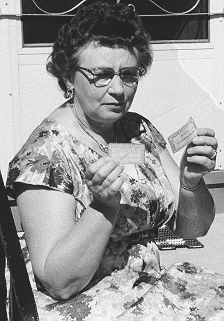 |
| Mrs. Whitcher compares the Social Security card “issued by Woolworth” with her own real card of the same number. |
|
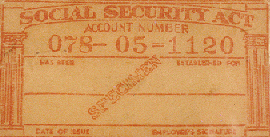
|
|
The card that started all the fuss!
|
|
| “Saturday I discovered I was pregnant—three months! Days of anguish over the money and the complications I feared would arise. Jacobson put me in the hands of a good German Jew who works for rich women. He said it would have to be done in two operations, one to insert a bag which dilates the womb (this is done without ether) and then a final one that is done with ether.
“I set the date for Wednesday, the 21st. I arrived at nine-thirty and was strapped like an insane person, wrists tied, arms, waist, legs—a strange sensation of utter helplessness. Then the doctor came in. As he began to work, he found the womb dilating so easily that he continued the operation in spite of the terrific pain. And so in six minutes of torture, I had done what is usually done with ether! But it was over. I couldn’t believe it. Hugh was so full of anguish, and Gonzalo…
“Soon I heard a whisper to me: ‘How was it?’ I reassured her—told her how I had been able to bear it without ether, so it would be nothing with ether… ‘My husband is away. He doesn’t know. He must never know.’ I couldn’t explain to her that my husband knew, but that my lover had to be deceived and made to believe I had no relations with Hugh.
“Lying there whispering about the pain, I had never felt such a strong kinship with a woman—this one I could not see, or identify, the one who was also lying on a cot, filled with primitive fear and an obscure sense of murder, or guilt, and of an unfair struggle against nature—an unequal struggle with all the man-made laws against us, endangering our lives, exposing us to inexperienced maneuvers, to being economically cheated and morally condemned—woman is truly the victim now… how much there is to be said against the ban on abortion…. Motherhood is a vocation like any other. It should be freely chosen, not imposed upon woman.” [August 22, 1940]
Mirages: The Unexpurgated Diary of Anaïs Nin, 1939-1947, edited by Paul Herron
|
“You’ll grow accustomed none the less!
No child will take its mother’s breast
At the start with willingness,
Yet soon it feeds with utmost zest”
Goethe – Faust (trans. Alice Rafael)
|
| “Everything tires me: I laboriously tow my boredom behind me, yawning away my life wherever I go.”
François-René de Chateaubriand – The Memoirs of Chateaubriand
|
| “I telephoned the antique dealer: will you come and see some antiques I have for sale? A Spanish-Moorish bedstead, an Indian lamp, an Arabian mirror, an Arabian coffee set, a Kali goddess. They have served their purpose. They furnished and decorated my days with Henry, my days with Gonzalo on the houseboat, and they were catalogued in my diary, glorified in the Under the Glass Bell stories. After that they died the death of objects no longer illuminated by a living essence. My attachment to them died, and objects lose their glow as soon as we do not inhabit them, caress them. When they arrived from France after years in storage, I saw they were dead. Antiques. Wreckage from great emotional journeys. I had moved away. They looked incongruous in this apartment, this place. With Rupert I looked at the bed of my past loves, the lamps of my nights of caresses, and my memory swathed them in the robes of mortuary winters. They were objects I no longer loved, as I no longer loved the people I had shared them with, and I was eager to destroy them.” [San Francisco, April 15, 1949]
Trapeze: The Unexpurgated Diary of Anaïs Nin, 1947-1955 – ed. by Paul Herron
|
| “‘Tisn’t beauty, so to speak, nor good talk necessarily. It’s just IT. Some women’ll stay in a man’s memory if they once walked down a street.”
Samuel Johnson
|
|
“Between thirty and forty, one is distracted by the
Five Lusts;
Between seventy and eighty, one is a prey to a
hundred diseases.
But from fifty to sixty, one is free from all ills;
Calm and still—the heart enjoys rest.
I have put behind me Love and Greed; I have
done with Profit and Fame;
Strength of limb I still possess to seek the rivers
and hills;
Still my heart has spirit enough to listen to flutes
and strings.
At leisure I open new wine and taste several
cups;
Drunken I recall old poems and sing a whole
volume.”
Po Chu-I (A.D. 772-846), translated by Arthur Waley (Christopher Morley’s Book of Days for 1931 [October 16])
|
| “Every time you make a choice you have to sacrifice something, and I am sacrificing my energy, writing and versatile intellectual life for grubbing over 66 Hawthorne papers a week and trying to be articulate in front of a rough class of spoiled bitches. If I knew how to teach a short story, or a novel, or a poem I’d at least have that joy. But I’m making it up as I go along, through trial and error, mostly error. . . I don’t like talking about D.H. Lawrence and about critics’ views of him. I like reading him selfishly for an influence on my own life and my own writing.” [November 5, 1957]
“I am taking things which would earlier have floored me—occasional sassiness, poor preparation for class by some girls, difficult office-hour conferences—more in my stride. I had a hard problem with a very nasty case of plagiarism in my last set of papers, so obvious as to be impossible as ‘a mistake,’ and had to send the girl to Honor Board. She is a very shifty character and wavering between a D plus and C minus, not preparing for class discussions and, unfortunately, just the sort who’d do something like this. She claimed it was all a mistake, she just ‘didn’t know how it happened,’ and I probably got much sicker over it than she did. But I sent her to Honor Board.”[December 8, 1957]
Sylvia Plath – Letters Home: Correspondence 1950-1963, ed. by Aurelia Schober Plath
|
| “I take Eli to the new dollar store to get a plastic colander. He runs up and down the aisles ecstatically. ‘Who made all these things?’ he asks me.
Weather – Jenny Offill
|

Comments are closed.
|
|








